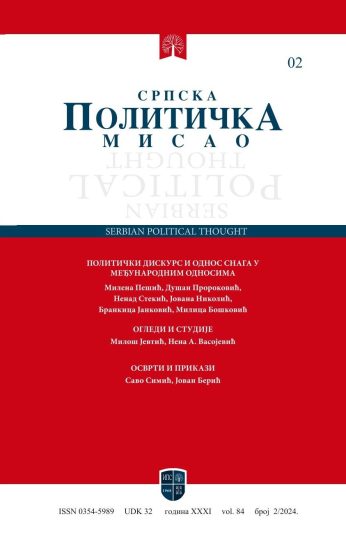Тема броја
ОГЛЕДИ И СТУДИЈЕ
A COMPARATIVE STUDY OF CHILD WELFARE IN SERBIA, CROATIA AND BOSNIA-HERZEGOVINA
Сажетак
The aim of this paper is to analyze, through comparative perspective, current systems of child welfare in transitional societies of the Southeast Europe: Croatia, Serbia and Bosnia-Herzegovina. In this paper we used historical, comparative and statistic method. Socio-political characteristics of these states are: mutual history of child welfare systems, transitional metamorphosis of society and social policy, European perspectives and the need for upgraded child welfare. Gavrilovićs point out the common past of child welfare systems of these states. In the main part of this work comparative methods are used to analyze current characteristics of child welfare in Serbia, Croatia and Bosnia-Herzegovina. Family and child support measures are taken into account, with special emphasis on child maintenance, maternity and parental leave and services of specialized children’s institutions. Child welfare is analyzed in the context of transitional changes that the Southeast European states are undergoing. Analysis of the three basic forms of finacial support of families with children showed that transitional changes substantially reduced the number of children benefiting from child maintenance and even more reduced its amount. Maternity leave is recognized as an important measure in family and population policy in all three states, but there are lack of means, compensation amount is under constant pressure to be lowered.
Референце
- Благојевић, Марина: Родитељство и фертилитет Србија деведесетих, Институт за социолошка истраживања Филозофског факултета у Београду, Београд, 1997.
- Braithwaite, Jeanine, Grootaert, Christiaan and Milanovic, Branko: Poverty and Social Assistance in Transition Countries, Palgrave Macmillan, New York, 2000.
- Брчко Дистрикт: Закон о дјечијој заштити, Службени гласник Брчко дистрикта, Брчко, 2003.
- Comstock, Ann, »Key Partners in Protecting Children and Supporting Families«, in Collected of Papers: Helping in Child Protective Services: A Competency Based Casework Handbook (editors: Brittain R. Chairmain and Debora Hunt), pg. 77-107, University Press, Oxford, 2004.
- Федерација Босне и Херцеговине: Закон о основама социјалне заштите, заштите цивилних жртаварата и заштите обитељи са дјецом, Службене новине Федерације Босне и Херцеговине, Сарајево, 1999а.
- Федерација Босне и Херцеговине: Закон о раду, Службене новине Федерације Босне и Херцеговине, Сарајево, 1999б.
- Гавриловић, Ана: Систем друштвене бриге о деци у Србији развој и перспектива, Службени гласник, Београд, 1998.
- Гавриловић, Ана: Социјална политика, Филозофски факултет у Бањој Луци, Бања Лука, 2005.
- Каменов, Емил, »Правно регулисање друштвене бриге о деци након укидања истоименог закона«, у зборнику Демографски зборник, књига VII Еволуција популационе политике у Србији 1945-2004, стр. 197-229, Српска академија наука и уметности Одељење друштвених наука, Београд, 2005.
- Лакићевић, Мира и Гавриловић, Ана: Социјални развој и планирање, Филозофски факултет у Бањој Луци, Бања Лука, 2009.
- Milanovic, Branko, “Social Costs of the Transition to Capitalism: Poland 1990-94”, in Collected of Papers: Social Justice and the Welfare State in Central and Eastern Europe: The impact of Privatization (editor: Iatridis S. Demetrius), pg. 153-167, CT Praeger, Westport, 2000.
- Милосављевић, Милосав, Гавриловић, Ана и Ђурашиновић, Пејо: Преображај породице, Филозофски факултет у Бањој Луци, Бања Лука,
- Nelson, Kenneth, “Social assistance and Minimum Income Benefits in Old and New EU Democracies”, International Journal of Social Welfare, 379-389, 19(4)/2010.
- Nicklett, Emily, Perron, Brian, Laws and Policies to Support the Wellbeing of Children: an International Comparative Analysis. International Journal of Social Welfare, pg. 3-7, 19(1)/2010.
- Orenstein, Mitchel and Hass, Martin, Globalization and the Development of Welfare States on Post-Communist Europe, BCSIA Discussion Paper 2002-02, Kennedy School of Government Harvard University, Harvard, 2002.
- Пуљиз, Владо, „Реформе сустава социјалне политике у Хрватској”, Ревија за социјалну политику, стр. 159-180, 8(2)/2001.
- Пуљиз, Владо: Социјална политика Хрватске, Правни факултет Свеучилишта у Загребу, Загреб, 2008.
- Република Србија: Закон о друштвеној бризи о деци, Службени гласник Републике Србије, Београд, 1992.
- Република Србија: Закон о финансијској подршци породици са децом, Службени гласник Репубилке Србије, Београд, 2002.
- Република Српска: Закон о дјечијој заштити, Службени гласник Републике Српске, Бања Лука, 2002.
- Република Српска. Закон о раду, Службени гласник Републике Српске, Бања Лука, 2007.
- Ringold, Dena and Kasek, Leslek, Social Assistance in the New EU Member States: Strengthening Performance and Labor Market Incentives, World Bank Publications, Washington, 2007.
- Зриншћак, Синиша, »Социјална политика у контексту корјените друштвене трансформације посткомунистичких земаља«, Ревија за социјалну политику, стр. 135-159, 10(2)/2003.
- Зриншћак, Синиша, “Обитељска политика”, у зборнику Социјална политика Хрватске (едитор Владо Пуљиз), стр. 279-336, Правни факултет Свеучилишта у Загребу, Загреб, 2008.

